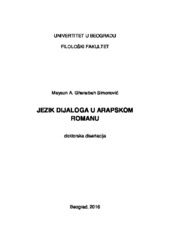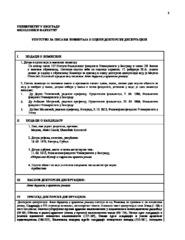Јezik dijaloga u arapskom romanu
The language of dialogue in the Arabic novel ; Язык диалога в арабском романе
| dc.contributor.advisor | Tanasković, Darko | |
| dc.creator | Gharaibeh-Simonović, Meysun A. | |
| dc.date.accessioned | 2017-04-10T13:55:49Z | |
| dc.date.available | 2017-04-10T13:55:49Z | |
| dc.date.available | 2020-07-03T10:09:35Z | |
| dc.date.issued | 2016-09-26 | |
| dc.identifier.uri | https://nardus.mpn.gov.rs/handle/123456789/7854 | |
| dc.identifier.uri | http://eteze.bg.ac.rs/application/showtheses?thesesId=4724 | |
| dc.identifier.uri | https://fedorabg.bg.ac.rs/fedora/get/o:14975/bdef:Content/download | |
| dc.identifier.uri | http://vbs.rs/scripts/cobiss?command=DISPLAY&base=70036&RID=48759823 | |
| dc.description.abstract | Sve do savremene epohe, pridržavanje normi „božanskog“ i „božanstvenog“ arapskog jezika presuđivalo je statusu književnog dela i njegovom pripajanju zvaničnom arhivu kulturnih uzora. Dela popularne i narodne književnosti istisnuta su iz ove reprezentativne riznice zbog prisustva nestandardnih varijeteta u njihovom sastavu. Dati lingvistički kriterijum u selekciji tekstova učinio je elitnu književnost jednim od najvažnijih svetovnih bastiona čistog, ispravnog, rečitog arapskog koda – fushe, ali i paravanom koji je prikrivao slojevitu jezičku stvarnost arapske govorne zajednice. Krajem XIX veka, lingvističke „pregrade” između pomenutih tipova književnosti relativizovane su pod uticajem savremenog lingvističkog pristupa, koji se temelji na posmatranju jezika kao evolutivnog bića. Tome je, zatim, doprineo uticaj književno-jezičkih principa iz zapadne književnosti, koju su arapski pisci počeli da prevode i oponašaju. Jezički preobražaj najpre je postao osetan u novim formama pripovedačke proze – drami, priči i romanu, dok su se arabljanski poetski kanoni, u okviru kojih se fusha podrazumevala kao jedino validno sredstvo izraza, zadržali sve do početka XX veka... | sr |
| dc.description.abstract | Until the contemporary era, the adherence to the norms of the “celestial” and “divine” Arabic language served as the final verdict on the status of a literary work and its inclusion into the offical archive of cultural models. The works of popular and folk literature were ousted from this representative treasury due to the presence of non-standard varieties in their texts. The given linguistic criterion in the textual selection made elite literature one of the staunchest secular bastions of the pure, correct, eloquent Arabic code – the Fusha, but also a screen that concealed a multi-layered linguistic reality of the Arabic-speaking community. In the late 19th century, the linguistic “barriers” between the above-mentioned types of literature were relativised under the influence of the contemporary linguistic approach, based on the observation of language as an entity prone to evolutionary change. Its cause was, thereafter, supported by literary-linguistic principles from Western literature, which Arabic authors engaged in translating and imitating. The language change was first felt in the new forms of narrative – the drama, the short story and the novel, whereas the Arabic poetic canons, within which the Fusha was taken for granted as the only valid means of expression, were preserved all until the early 20th century... | en |
| dc.format | application/pdf | |
| dc.language | sr | |
| dc.publisher | Универзитет у Београду, Филолошки факултет | sr |
| dc.rights | openAccess | en |
| dc.rights.uri | https://creativecommons.org/licenses/by-nc-nd/4.0/ | |
| dc.source | Универзитет у Београду | sr |
| dc.subject | poetska funkcija jezika | sr |
| dc.subject | poetic function of language | en |
| dc.subject | continuum of the Arabic language | en |
| dc.subject | Fusha | en |
| dc.subject | Ammiya | en |
| dc.subject | Arabic prose literature | en |
| dc.subject | contemporary Egyptian novel | en |
| dc.subject | language of literary dialogue | en |
| dc.subject | language of narration | en |
| dc.subject | kontinuum arapskog jezika | sr |
| dc.subject | fusha | sr |
| dc.subject | amija | sr |
| dc.subject | prozna arapska književnost | sr |
| dc.subject | savremeni egipatski roman | sr |
| dc.subject | jezik književnog dijaloga | sr |
| dc.subject | jezik naracije | sr |
| dc.title | Јezik dijaloga u arapskom romanu | sr |
| dc.title.alternative | The language of dialogue in the Arabic novel ; Язык диалога в арабском романе | en |
| dc.type | doctoralThesis | en |
| dc.rights.license | BY-NC-ND | |
| dcterms.abstract | Танасковић, Дарко; Гхараибех-Симоновић, Меyсун A.; Jezik dijaloga u arapskom romanu; | |
| dc.identifier.fulltext | https://nardus.mpn.gov.rs/bitstream/id/28618/Disertacija.pdf | |
| dc.identifier.fulltext | https://nardus.mpn.gov.rs/bitstream/id/28619/IzvestajKomisije8128.pdf | |
| dc.identifier.fulltext | http://nardus.mpn.gov.rs/bitstream/id/28618/Disertacija.pdf | |
| dc.identifier.fulltext | http://nardus.mpn.gov.rs/bitstream/id/28619/IzvestajKomisije8128.pdf | |
| dc.identifier.rcub | https://hdl.handle.net/21.15107/rcub_nardus_7854 |



